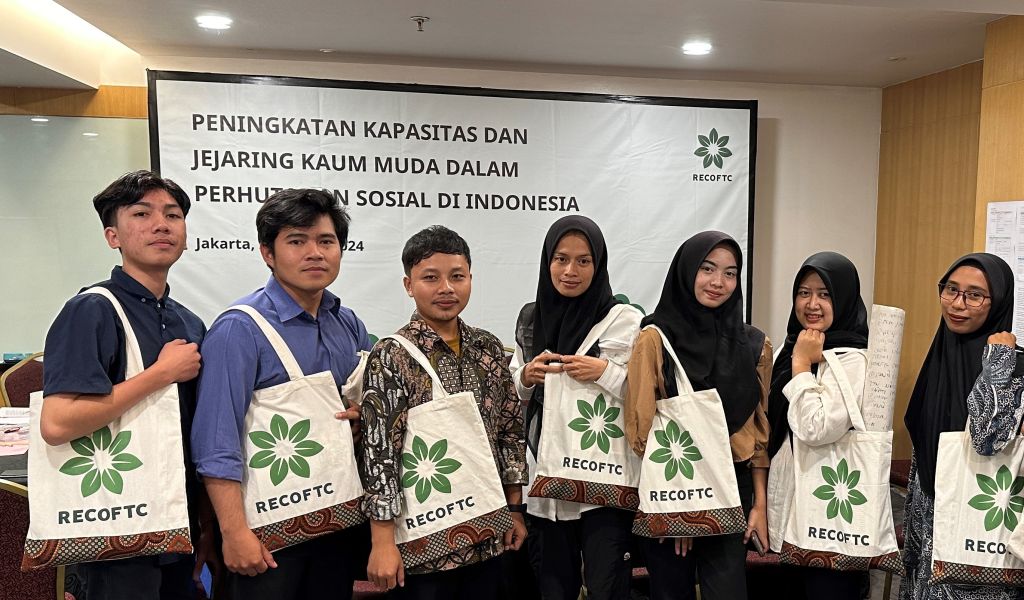Empowering Indonesian youth for sustainable forest management and national development

With global challenges becoming increasingly complex, young people have emerged as crucial agents for achieving sustainable development. According to the United Nations, in 2020, youth aged 15–24 accounted for 1.2 billion people, or about 16 percent of the global population. This number is projected to reach 1.3 billion by 2030, highlighting the important role youth play in driving social, economic and environmental progress.
Indonesia boasts a significant youth demographic. In 2023, over 64 million people aged 16–30 made up approximately 24 percent of the country’s population. This demographic dividend – where 74 percent of the productive age population consists of Generation Z (38 percent) and millennials (36 percent) – presents a unique opportunity for national development. In this context, social forestry programs have emerged as a vital avenue for creating job opportunities and stimulating economic growth through innovative entrepreneurship in the environmental and forestry sectors.
Recognizing the potential of youth in sustainable development, RECOFTC Indonesia has launched a gender equality and social inclusion (GESI) initiative to support the Indonesian government’s efforts in empowering young people and promoting inclusivity. RECOFTC organized a training event in Jakarta from 26 to 29 May 2024, aimed at enhancing the capacities of young people and fostering networks in social forestry management.
Youth training: Preparing social forestry leaders
The training program aimed to nurture local champions among young people. The participants came from families who have received social forestry management approvals from the government. The goal of the training was to equip these youth with skills to manage forest resources sustainably.
The four-day intensive training brought together 21 participants from diverse regions including South Sulawesi, West Java, Riau and West Sumatra. Participants and expert trainers engaged in direct, hands-on learning.
Akri Sandri, a participant from Rambahan village in Riau, says that the event helped deepen his understanding of social forestry concepts and imparted practical skills essential for sustainable forest management. "It has been an invaluable learning opportunity,” he said. “I gained significant knowledge about forests and social forestry schemes, which I can apply in my community.”
Aris Ramdani from Sukabumi, who was elected as a class leader during the training, adds, “Learning about the management of social forestry business groups during our field visit to Sunter Agung was eye-opening. I now understand the importance of gender equality in leadership and daily activities."
Similarly, Rini Hasanah, a participant from West Sumatra, who received an award for her efforts, reflects on her experience saying, “This training opened my eyes and provided a wealth of new knowledge.” Hasanah, who works as a social forestry companion (extension worker) for LPHN (or Village Forest Management Institution) Ranah Pantai Cermin in the UPTD KPHL (or Technical Implementation Unit of the Protected Forest Management Unit Service) Hulu Batanghari area, exemplifies how participants can immediately apply their learning in their communities.
Social forestry, sustainability and youth involvement
Social forestry management approvals are a key component of Indonesia’s national social forestry program initiated by President Joko Widodo in 2014.
Social forestry grants communities the right to manage state forests for 35 years or more. This approach aims to improve the welfare of forest-dependent communities while ensuring sustainable forest management.
Speaking at the training workshop, Ir Nurhasnih, MM, Head of Social Forestry Entrepreneurship Sub-Directorate emphasized the forestry program’s significance. "We must balance community livelihoods with forest sustainability,” he said.
Nurhasnih also elaborated on the significance of innovation and youth involvement in social forestry. “Entrepreneurship in forestry can support the balance between community livelihoods and forest sustainability, and young people are key to making it happen,” he said. “The energy and innovative ideas of young people can drive sustainable practices that benefit both forests and communities."
Capacity-building through a holistic training series
The May training was the first of a two-part capacity-building program for young people in social forestry. To build on this in-person training, RECOFTC Indonesia has planned an online training for September 2024. This remote training will leverage digital technology to facilitate ongoing learning and collaboration. Participants from various regions will engage in interactive online modules and receive practical assignments to apply their knowledge in local contexts.
RECOFTC Indonesia aims to cultivate competent and committed young leaders for sustainable development through these trainings. Gamma Galudra, Director of RECOFTC Indonesia, emphasizes the importance of youth involvement saying, "In addressing global challenges like environmental degradation and deforestation, young people play a crucial role in providing motivation and driving action.” He adds, “Through various initiatives, including this training program, RECOFTC Indonesia supports the government's efforts to build capacity and create youth networks focused on social forestry.”
Impact and future expectations
The GESI training program goes beyond increasing knowledge of social forestry. It expands participants’ professional networks and fosters a global perspective. Participants gain practical insights and develop a deeper understanding of gender equality in forest management.
The program has been designed to empower young people as agents of change in forestry, environmental conservation and social development. Looking ahead, it will continue to focus on building youth capacity in social forestry over the next five years. Reny Juita, Partnership Coordinator of RECOFTC Indonesia, outlines the long-term vision saying, “We are preparing the next generation to manage forest areas under social forestry permits. Our goal is to develop local champions who will implement and advance social forestry in their villages.”
By investing in youth training and empowerment, RECOFTC Indonesia is paving the way for sustainable forest management and community development. The program's success will be measured not just in the knowledge gained, but in the tangible improvements to forest conservation and community well-being across Indonesia.
###
RECOFTC’s work is made possible with the support of the Swiss Agency for Development and Cooperation and the Government of Sweden.

